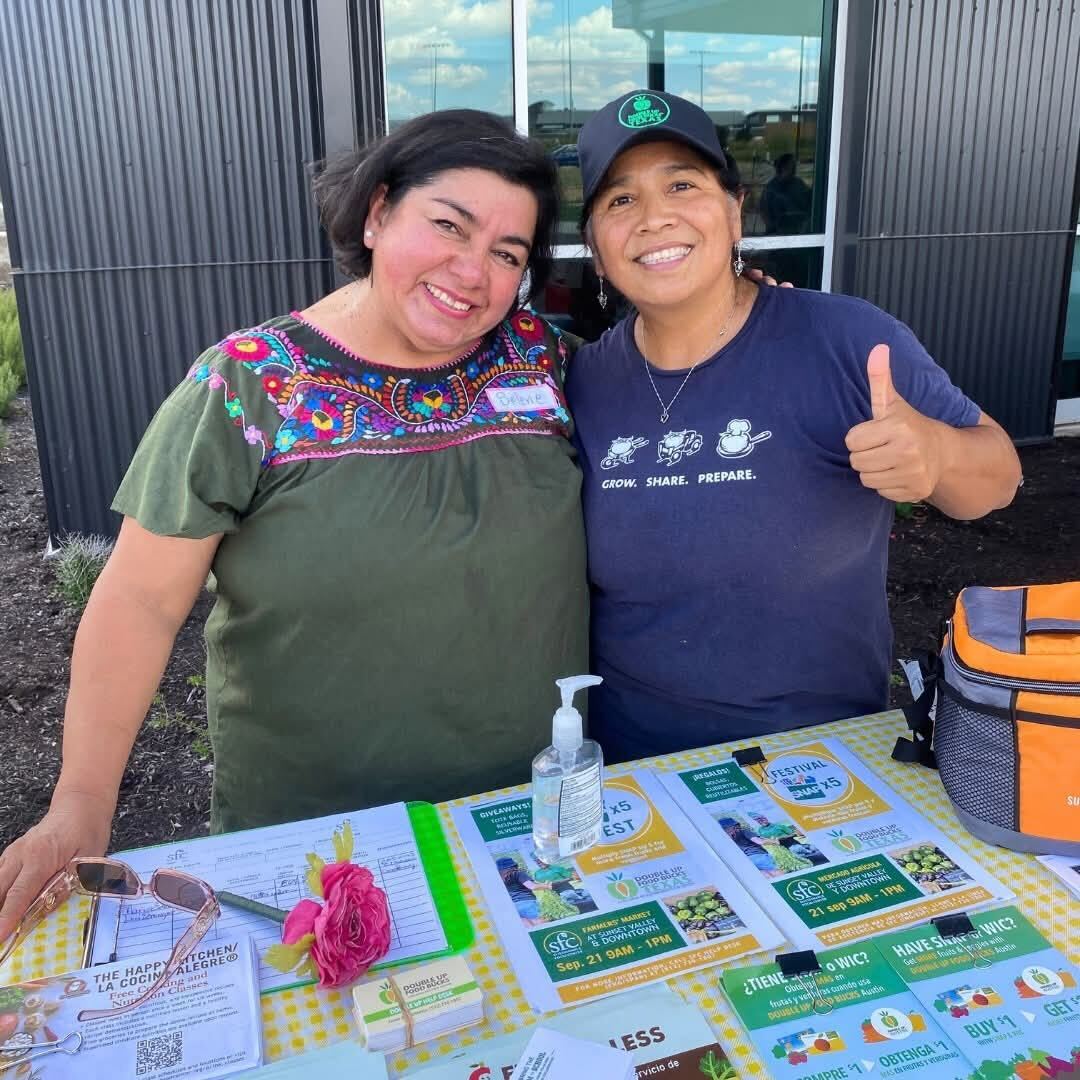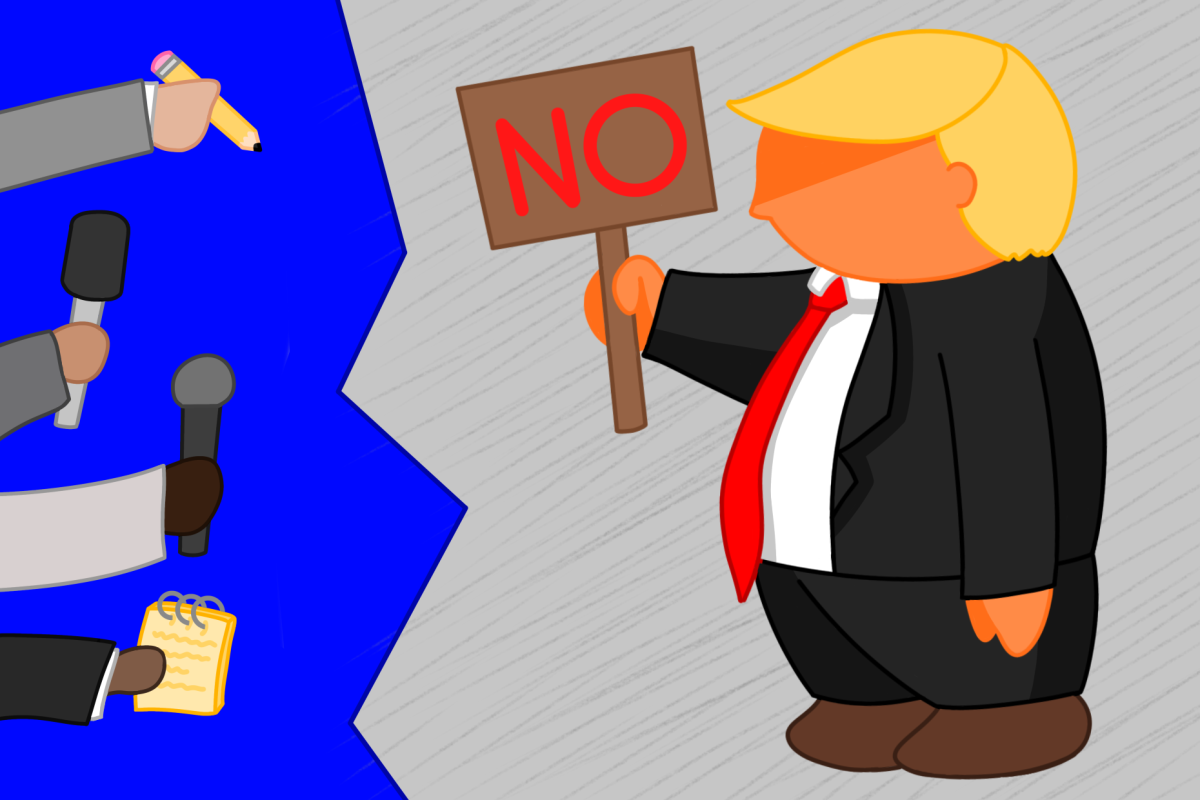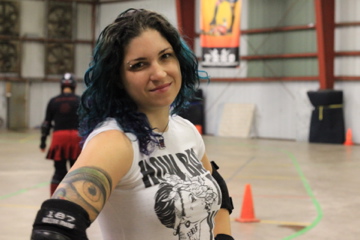Starting at her elbow, a kaleidoscope of bright colors swirls upward to frame an inked replica of the Eye of Horus on the middle of her bicep. The Eye, an ancient Egyptian symbol for protection, royal power and good health, is the commemorative mark for the scar she does not have. The pupil permanently stains the spot where Austin rollergirl Kara “Lyka Boss” Cordell’s humerus broke in half.
The tattoo was a necessary part of the healing process. She needed something to visibly symbolize the injury that almost broke her.
Story and Photos by Jane Claire Hervey
When the legendary Ann “Demon of the Derby” Calvello, broke her nose 12 times playing derby, she had blindness in one eye to prove it. When Putas del Fuego player Bentley Screws broke her leg after a fall on the banked track — a bowl-shaped structure of wooden planks for skaters to compete on — the repair resulted in a railroad-like pattern of skin and tissue. When anyone asks about these girls’ scars, the players have a chance to talk about the injury — the injury that defines their dedication to derby.
“If I don’t talk about it, the story will just die,” Boss, 27, says.
In the fall of 2010, Boss moved to Austin from Los Angeles. Originally from the Midwest, she had just graduated from the California Institute of Art with a major in costume design, and Austin was the right place for a new adventure. She missed the open tryouts for the Texas Roller Derby league by a few days, but her derby trainers from California called TXRD to vouch for her rollergirl potential. Boss had tried out for the LA Derby Dolls, but moved before she could be placed on a team. Her attitude and athleticism, though, had impressed the coaches.
Because of their advocacy, she scored a private Austin audition.
Because of her talent, the team Putas del Fuego, or the “Hot Bitches,” drafted her.
With about three months left before the start of the season, she began her training as a Puta. Twice a week, she met with the team for two hours in an old warehouse in North Austin. There, Boss familiarized herself with the team, from the way a Puta turned about on the track to the way a teammate’s kneepads smelled after practice.
Boss had spent all of her childhood playing sports, from basketball to volleyball, but she says nothing compares to derby. The community that forms around the love for wheels, sweat and a wooden track makes her feel accepted. Her pierced eyebrow, multiple tattoos and blue streaks of hair (the color depends on the day) blend right in.
A couple of weeks before her first bout, the official name for a game in derby, Boss did what most derby girls do with their team: She partied. The Putas planned to spend the night bonding at the bowling bar, the Highball, to celebrate the start of the spring 2011 season.
As the Putas’ first draft pick for that year, Boss had already developed a reputation. She could out-skate anyone on eight wheels in a pair of fishnet tights. Her captain, Crybaby, says Boss was “determined,” “opinionated” and “ferocious” — the Puta personality trifecta. A testament to her strength as a player, Boss had arm-wrestled the entire team and won. For Texas Roller Derby girls, this means something. If a rollergirl breaks a rule during a bout, she must spin the penalty wheel to determine her punishment, which could be an arm-wrestling match. Boss’ ability to arm-wrestle could rectify the team’s mistakes in the penalty box.
So, when Boss arrived at the season kickoff party that night, in what she calls “six-inch, crazy-ass platform heels” and the standard derby outfit of studs and mini-skirts, her teammates rushed her to the stage to defend the Puta name. Although her arm felt sore from all of the arm-wrestling she had done throughout the week, Boss sat opposite her opponent, another rollergirl’s friend.
“I just remember thinking, ‘I’m the new girl. I’m undefeated. I’m on stage. I have to win,’” she says.
Captain Crybaby made her way up to the stage, too, to watch her No. 1 Rookie win the party. (Party spirit is a derby essential.) “Boss had already done a bunch of different arm-wrestling gigs, and she had beat the reigning champ of Texas Roller Derby, so we were pumped,” Crybaby says.
Cheering on Boss, the team, their friends, boyfriends, girlfriends and fans gathered around the stage. Within minutes, Boss had her challenger’s fist inches from the table. Close to defeat — with the emcee chanting, “you’re going to lose to a girl!” — Boss’ adversary stood up and shoved the weight of his body against her hand. Amused by his move, Boss let out one of her signature, hearty chuckles.
Then, the crowd gasped in unison.
“I remember hearing it pop and watching her arm do something crazy,” Crybaby says.
Somehow, his push split Boss’ humerus in half.
Dr. Evil, the derby league’s emergency medical technician, was the first to run over. He repositioned her arm, so Boss could hold her now noodle-like limb against her chest.
“Just look at me, I’m going to get you out of here,” Crybaby, who had made it through the packed bar to Boss, told her. An army of Putas pushed a path through the crowd. Her boyfriend ran outside to pull the car around. While Boss and the team drove to the hospital, spare change and loose dollars found their way into an empty skate — the donation bucket for Boss’ expected medical expenses.
Boss, who had yet to shed a tear, and her posse of Putas pulled into the emergency room at St. David’s Medical Center as a unit distinguishable by their uniform of short skirts, fishnets and little heels. “Everybody rolls in the hospital with my boyfriend, and I guess it looks like he’s a total pimp,” Boss says.
The team had to wait a couple of hours for a doctor to see Boss, but a smuggled flask of pineapple-flavored vodka and a couple of shots helped to pass the time. The team hoped Boss could return to the party with her arm in a sling, but the bone was not set until 2 a.m. At that point, the bar had closed. The party was over. Boss and the team went home.
When Boss woke up the next morning, she could feel her bones rubbing together. “Nothing was connected. Everything was just floating in my skin,” she says.
She spent the next couple of weeks alone. Her boyfriend worked all day, and if team members did come by, she does not remember. Her first season of roller derby, the season she had just spent three months training so hard for, had been taken away. “I didn’t want to be in my body,” she says. “So, I would smoke. I would drink. I would take my Vicodin.”
Boss tried to come to practice, but she initially could not make it through the mandatory, two-hour, bi-weekly trainings without crying. “She is a competitive athlete,” Crybaby says. “Seeing it from her aspect that she wants to compete and cannot, there’s nothing worse.”
Crybaby says that was tough to handle as a coach, too. Not only had she lost her first draft pick, but she also had to recreate her team lineup. She had intended for Boss to become one of the Putas’ jammers, a position played by the fastest girls on the team. Jammers have to be quick enough to make it past a wall of four blockers to score points during a jam, the one-minute intervals for game time in derby. But Boss was no longer an option.
Boss became depressed. The cast, extending to her shoulder, made everyday tasks difficult. Derby was the only thing she wanted to do. Showering and cooking felt impossible. For a while, she had to sleep sitting up. She would only leave her apartment to go to her job at the animal shelter, where she swept cat poop with one arm. “When people put roller derby first and then can’t do that, it’s devastating. It’s like going through a break up or just some part of your life that you can’t do it anymore. Like any sports injury,” Crybaby explains.
Boss was not the first player TXRD had temporarily lost, either.
A few months ago, a hard block sent the head of a player from the Cherry Bombs team into the metal railing that encircles the track. She bruised her brain and suffered from amnesia, but came back to play once she recuperated. Recently, a forceful hit slammed Puta member Carnage’s calf against the railing, too. From her knee down to her ankle, the flesh swelled to double its size, but she only had to sit out a couple of practices. Every rollergirl has seen some type of injury. Unlike Boss, they are usually not out for their inaugural season.
But Boss still showed up to every bout day — there are only four per year — to cheer for the Putas from the sidelines. While her team battled against other teams, like the Rhinestone Cowgirls or the Holy Rollers, Boss fired up the crowd. “She was a firecracker. The energy she brought to our bout days was a complete 180 to practice. There’s no better person than her at building our fan base.” Crybaby says. So, when the Putas had to decide whether or not they would give Boss’ spot away, they chose to save it.
Eventually, Boss’ humerus regrew. The cast came off. Her arm, thicker than it was before, healed in time for the last game of the season.
But Boss was hesitant on game day. She felt changed by the injury, mostly because of the depression, and doubted her ability to skate. Despite the nerves, she stuck her feet into a pair of traditional derby quad skates and stepped onto the banked track.
The bout was terrifying — someone broke a hand, another player broke her shoulder and another shattered a rib — but Boss skated through damage-free. With her first post-injury game behind her, the depressive fog lifted. Able to attend practices and actually play, Boss says her confidence came back.
Although she had been worried she would never be able to arm-wrestle, she again became the undefeated arm-wrestling champ. She started to teach classes on Sundays for derby hopefuls still skittish on their skates. She enrolled in massage school, with plans of becoming the league’s go-to masseuse. And, within two years, she ascended to the ranks of the All-Scar Army, a veteran circle for TXRD’s most valuable rollergirls.
Slowly, Boss rejoined the community her broken arm had left her disconnected from.
Now, she works at Slake Café on 7th Street. Most of the customers know her by name — either as the “Slake girl” or “that roller derby chick.” When off of work, Boss goes to class, studies or heads to the training track.
She also lives in the “Puta Palace,” a house in northeast Austin where Putas del Fuego promotional posters cover the walls, and her car, covered in Puta bumper stickers, sits on the curb by the driveway. Fellow Putas come to the palace to party and watch film from previous games. Boss and Carnage, who doubles as Boss’ teammate and roommate, plan to get the Puta motto, “por vida,” which means “for life” in English, tattooed on the inside of their lips. No matter what happens, Boss says she has no plans to retire from derby — she wants to become captain of the Putas one day.
Her broken humerus seems like a distant memory, but Boss will never forget what it felt like not to play. For this reason, she says she gives derby her time and effort, whether that means clocking more time on the track or running an extra lap during warm-ups outside the warehouse. It’s worth it, Boss says. After all, derby is her favorite sport. Looking at her tattoo, she adds, “No way could I live in Texas and not play derby.”
















































Shanx • Jun 19, 2014 at 2:50 am
Las Putas del Fuego means The Whores of Fire